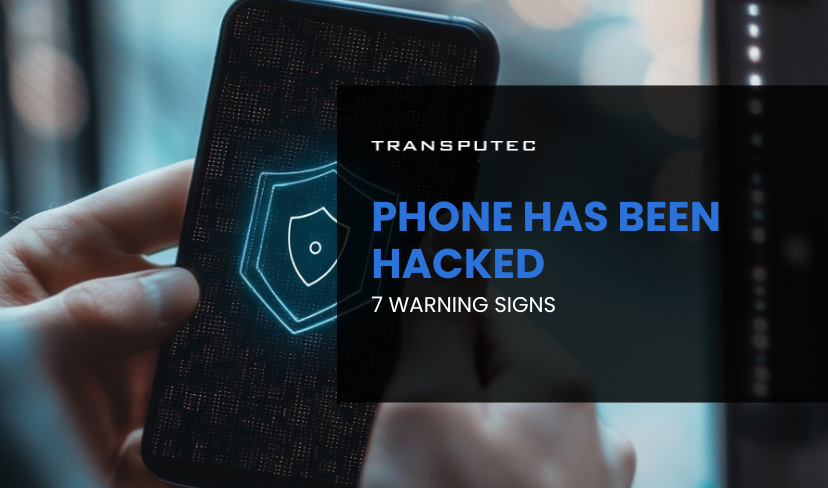Written by KRITIKA SINHA | MARKETING
Your smartphone contains your entire digital life – banking details, personal messages, business emails, and private photos. Recent statistics from Kaspersky reveal that mobile malware attacks increased by 95% in 2023, with business phones being prime targets. When your phone gets hacked, the consequences extend far beyond personal inconvenience – it can lead to devastating data breaches, financial losses, and reputation damage.
In this blog, we’ll explore the 7 warning signs your phone has been hacked and provide actionable advice to secure your device. You’ll learn to detect unusual behaviours and strengthen your phone’s defences—an essential read for business owners and employees alike.
Why Phones Are a Prime Target for Hackers
The modern smartphone isn’t just a device; it’s a treasure trove of personal and professional data. Hackers exploit phones to access:
- Banking apps and sensitive financial records.
- Corporate emails, strategy documents, and intellectual property.
- Personal photos, social media accounts, and messaging apps.
Understanding the signs of a hacked phone empowers individuals to act swiftly and prevent cascading damage.
7 Warning Signs Your Phone Has Been Hacked
1. Unusual Battery Drain: The Silent Thief
One of the most common yet often overlooked signs that your phone has been hacked is an unusually rapid battery drain. If you find yourself reaching for the charger more frequently than usual, it might not just be your phone showing its age.
What to look for:
- Battery draining much quicker than usual.
- The phone feels unusually warm, even when idle.
Action steps:
- Check your battery usage in settings to identify power-hungry apps.
- Uninstall any suspicious applications
- Consider performing a factory reset if the issue persists.
2. Unexplained Data Usage: The Hidden Culprit
A sudden spike in data usage without any changes to your browsing habits is another red flag that your phone may have been hacked.
Why it matters:
Hackers can use your data connection to transmit stolen information or perform malicious activities, potentially leading to unexpected charges on your bill.
How to check:
- Review your data usage in your phone’s settings.
- Compare it with your typical monthly usage.
- Look for any unfamiliar apps consuming large amounts of data.
Pro tip: Set up data usage alerts with your carrier to catch unusual activity early.
3. Strange Texts and Calls: The Unwanted Messenger
If your contacts report receiving odd messages or calls from your number that you didn’t send, it’s time to be on high alert.
Potential consequences:
- Damage to personal and professional relationships.
- Spread of malware to your contacts.
- Financial losses through premium rate calls or messages.
What to do:
- Inform your contacts about the situation.
- Change your phone’s password or PIN immediately.
- Enable two-factor authentication on your accounts.
4. Unfamiliar Apps: The Uninvited Guests
The sudden appearance of apps you don’t remember downloading is a clear sign that your phone has been compromised.
Why it’s dangerous:
These apps could be spyware, designed to collect your personal information or grant hackers remote access to your device.
How to address it:
- Regularly review your installed apps.
- Research any unfamiliar applications.
- Uninstall anything suspicious immediately.
Remember: Only download apps from official stores like Google Play or the Apple App Store.
5. Poor Performance: The Digital Slowdown
If your once-speedy smartphone is suddenly sluggish, it might be more than just ageing hardware.
What’s happening:
Malware running in the background can consume your phone’s resources, leading to slower performance and frequent crashes.
Signs to watch for:
- Apps taking longer to open or frequently crashing.
- General system slowdowns
- Unexpected restarts.
Solution: Run a reputable antivirus scan and consider a factory reset if problems persist.
6. Pop-ups and Ads: The Unwelcome Intruders
An influx of pop-up ads, especially when you’re not using a browser, is a telltale sign of malware infection.
Why it’s problematic:
- Disrupts your user experience
- This may lead to further malware infections if clicked
- Could be part of a phishing scheme
How to combat it:
- Install a reliable ad-blocker
- Avoid clicking on any suspicious ads
- Perform a thorough malware scan
7. Account Breaches: The Digital Break-in
Unauthorised activity on your online accounts, such as social media or banking, could indicate that your phone has been hacked.
Potential risks:
- Identity theft
- Financial fraud
- Loss of personal and sensitive information
Protective measures:
- Regularly monitor your accounts for suspicious activity
- Use strong, unique passwords for each account
- Enable two-factor authentication wherever possible
Protect your Business 24/7 with Transputec!
Our Managed SOC Cost Calculator estimates potential expenses for security tools and other costs based on your requirements.
How to Prevent Phone Hacking
Here are five effective points on how to prevent phone hacking:
1. Keep Your Software Updated
Regularly updating your phone’s operating system and applications is crucial. Software updates often include security patches that fix vulnerabilities exploited by hackers. By staying current, you minimise the risk of falling victim to known exploits. Enable automatic updates whenever possible to ensure you don’t miss critical security enhancements.
2. Use Strong Passwords and Two-Factor Authentication
A strong, complex password is your first line of defence against unauthorised access. Avoid easily guessable passwords and consider using a password manager to generate and store unique passwords for each of your accounts. Additionally, enable two-factor authentication (2FA) for an extra layer of security. This requires a second form of verification, such as a code sent to your phone, making it significantly harder for hackers to gain access even if they have your password.
3. Be Cautious with Public Wi-Fi
Public Wi-Fi networks are often unsecured, making them prime targets for hackers looking to intercept data. Avoid connecting to public Wi-Fi without a Virtual Private Network (VPN), which encrypts your internet traffic and protects your sensitive information from prying eyes. If you must use public Wi-Fi, ensure that you connect through a reputable VPN service.
4. Download Apps Only from Official Sources
Stick to downloading apps from official app stores like Google Play or the Apple App Store. Third-party app stores may offer tempting free versions of paid apps but often lack the rigorous security checks of official platforms, increasing the risk of malware infections. Before downloading any app, review its permissions and user reviews to ensure it’s safe.
5. Manage Bluetooth and Location Settings
Turn off Bluetooth when not in use to prevent unauthorised access to your device through this channel. Similarly, be cautious about granting location permissions to apps; only allow access when necessary and choose apps that require minimal permissions. Regularly review app permissions in your settings to ensure that no app has access to more information than it needs.
Conclusion
In today’s digital age, our smartphones are gateways to our personal and professional lives. Recognising the 7 warning signs your phone has been hacked is crucial for protecting your privacy, finances, and peace of mind. From unusual battery drains to unexpected pop-ups, each sign serves as an alert to potential security breaches.
By staying informed and proactive, you can significantly reduce the risk of falling victim to cybercriminals. Remember, cybersecurity is an ongoing process, not a one-time fix. Regularly updating your software, being cautious about the apps you install, and monitoring your device’s behaviour are all essential practices in maintaining your digital security. Don’t wait until it’s too late. If you’ve noticed any of these warning signs or want to enhance your mobile security, it’s time to take action. Transputec’s team of cybersecurity experts is here to help you safeguard your digital life.
Contact us today to learn more about our comprehensive mobile security solutions and how we can help protect you from the ever-evolving landscape of cyber threats. Let’s work together to keep your digital world secure.

Secure Your Business!
Ready to explore how we can enhance your security posture? Contact us today to speak with one of our experts.
FAQs
How can Transputec help if I suspect my phone has been hacked?
Transputec offers comprehensive mobile security assessments and solutions. Our experts can analyse your device, remove any malware, and implement robust security measures to prevent future attacks.
What sets Transputec’s cybersecurity services apart from others?
Transputec combines cutting-edge technology with expert human analysis to provide tailored security solutions. We offer ongoing support and education to ensure long-term protection for our clients.
Does Transputec provide services for both individual and business mobile security?
Yes, Transputec offers scalable solutions for both individual users and businesses of all sizes, ensuring comprehensive protection across personal and professional devices.
Can Transputec help recover data if my phone has been hacked?
Transputec’s data recovery experts can assist in retrieving lost or compromised data, as well as implementing stronger backup and security measures to prevent future data loss.
How often should I have my phone’s security checked by professionals like Transputec?
We recommend a thorough security check at least annually, or immediately if you notice any of the 7 warning signs your phone has been hacked. Transputec also offers ongoing monitoring services for continuous protection.




